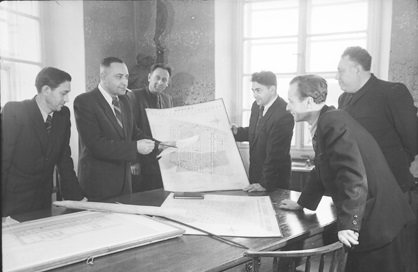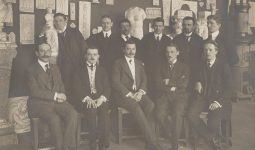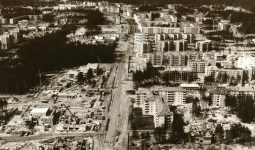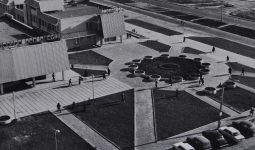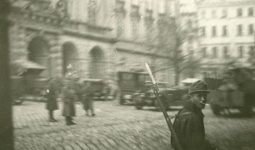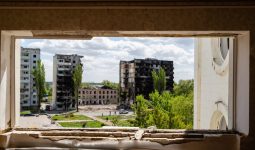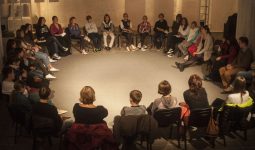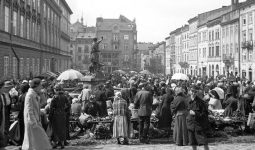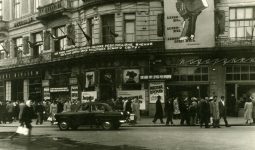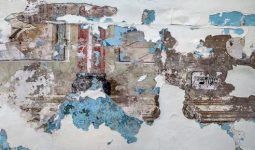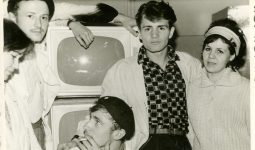Urban Experts and Changing Cities: Reshaping Professional Field (1970s-2010s)
Dr. Natalia Otrishchenko
2018 - present
The Renaissance in preparing and adoption of urban strategies that we can now observe in Ukraine brings us back to the idea that the city is emerging not only as a result of chaotic neo-liberal and capitalist processes, but also it could be planned to some degree. Even when contemporary practice of strategy-writing came to Ukrainian context mainly "from the outside," it also has local roots, which grew out from the times of planned economy and attempts to involve science and technology specialists in decision-making process. The community of those who create the visions of the future of the city and who can be called urban experts will be in the core of this study.
To imagine and to plan how the city should develop or function is usually the task of theorists and practitioners in the fields of governance, economics, sociology, architecture, urban planning, engineering, ecology, etc. They adopt terminology to describe the past, present and future of the city, formulate key problems, and propose possible solutions. The composition of this group depended on a number of factors, such as formal and informal power hierarchies, access to economic, social and cultural capitals, the availability of various sources of information, communication spaces, institutional capacities for personal development. Some of these factors have lost their relevance, while the others remain unchanged for many decades. This project aims to trace the specifics of professional milieu of city experts, its transformation over the last forty years, and the response to social changes, to indicate the continuances and disruptions, to identify the sources of their expertise and the specifics of the relationships between professional communities and different audiences, including those who make decisions and who live in the city.
Although the networks of dissemination of expert knowledge are transnational, they need specific nodes-cities. Therefore, the analysis will focus on the example of Lviv, which became an important informational and industrial center during the second half of the twentieth century. The main focus will be made on the group of urban planners who were imagining the "shape" of the city and scientists who had conceptualized the social fabric, the needs of residents, their everyday practices and expectations of urban life. In addition to the structural characteristics of the field of urban expertise, the study also seeks to outline the discourse that representatives of professional communities used to describe the city of the future.
The project is based on biographical interviews, publications and personal materials, both textual and visual, of city experts, and archival work.
Related Publications:
Otrishchenko, N. (2022). "Looking Forward, Looking Back: Ways of Re-Connecting Urban Planning Education in Lviv". Studia Historiae Scientiarum 21, 485–514. DOI: 10.4467/2543702XSHS.22.015.15981
Otrishchenko, N. (2022). "From Frame to Environment: Discussing the Development of Lviv during the 1980s". After Socialist Modernism. Architecture, Urban Design and Planning 1980s; City: History, Culture, Society 1 (13), 198–213.
Отріщенко, Н. (2021). "Перезбирання експертності". Глобальні та локальні кризи: переосмислюючи українське суспільство. Матеріали міжнародних соціологічних читань пам’яті Н. В. Паніної / За наук. ред. Є. І. Головахи, О. Г. Стегнія, О. О. Максименко. – Київ: Інститут соціології НАНУ, 132–41.
Otrishchenko, N. (2019). “Reclaiming positions and reimagining the city? Lviv urban experts since the late 1980s” (295–301). In: Three Decades of Post-socialist Transition. Conference Proceedings, ed. by N. Camprag, A. Suri. Darmstadt: TUprints.
Presentations:
December 2022 – “End of Professional Autonomy? Lviv Urban Planners between State, Private Investors, and City Inhabitants” / SKAT Seminar, Columbia University, New York.
November 2022 – “Before and After ‘the Fracture’: Positioning of Lviv Urban Planners”, панель “Professional Elites during Transition from Late Socialism to Post-communism”/ 54th ASEEES Convention, Chicago.
September 2022 – “Redefined Autonomy of Urban Planning Professionals during 1990s: Case of Lviv”, “When Did Reforms End? Change or Perpetuity after Socialism” / Leibniz Centre for Contemporary History Potsdam (ZZF), online.
May 2022 – “Negotiating expertise after 1991: Case of Lviv Urban Planners” / 5th International Oral History Conference, Greek Oral History Association “Narrating Working Lives: Ruptures, Turning Points, Trajectories”, University of Crete, Rethymno.
October 2021 – “From Frame to Environment: Discussing Development of Lviv during 1980s” / “After Socialist Modernism”, Державна наукова архітектурно-будівельна бібліотека ім. В. Заболотного, Київ.
September 2021 – “Designing Future during Social Changes: Urban Professionals and City Planning Ideas after State Socialism” / 15th ESA Conference “Sociological Knowledges for Alternative Futures”, Barcelona, online.
June 2021 – “‘Some Kind of Numbness’: 1990s in Professional Biographies of Lviv Urban Planners” / “Transformation Narratives Beyond Winners and Losers: Deep Stories in Central and Eastern Europe”, Vilnius University, online.
May 2021 – “City Turns West: Mobility and Collaborations of Lviv Architects during 1990s” / “City and Cityness in Central Eastern Europe”, Wroclaw University, online.
September 2020 – "Connections and Continuance: Urban Planning Education in (Post-) Socialist Lviv" / "Agency versus/with Structure: On the Question of how Transformation is Enacted", Online-workshop, the Leibniz Centre for Contemporary History Potsdam (ZZF).
June 2020 – "Continuance or Rupture? Discussing Lviv’s Future in the late 1980s and early 1990s" / Urban seminar, Center for Urban History.\
February 2020 – "The Rise and Fall of Underground Tram in Socialist L’viv" / "Cities in the USSR and the Eastern Bloc: Urbanization, Ecology and the Municipal Economy (1917-1991)", University of Erlangen-Nuremberg.
November 2019 – "One Plan to Rule Them All: Architects and the Visions of Urban Development in Late Soviet Lviv" / The Danyliw Seminar on Contemporary Ukraine, the Chair of Ukrainian Studies, University of Ottawa.
May 2019 – "Reclaim positions and reimagine the city? Lviv urban experts since the late 1980s” / "Three Decades of Post-socialist Transition", TU Darmstadt.
April 2019 – "‘People Who Own the Territory’: Expert Knowledge and Urban Planning in Lviv during the 1970s–80s" / "Communist Parties in East Central Europe: Frameworks of KnowledgeAcquisition and Dissemination 1945–1989", Central European University.
Червень 24-30, 2018 – презентація "The Same Hands’: Urban Experts and Long-Term Transformations (1977-2017)" під час Ninth International Social Science Summer School in Ukraine, Запоріжжя.
Сover Image: "Persikov, the city's chief architect, and public representatives of the city are discussing the project of memorial cemetery at the Hill of Glory." Photo by K. Buzinina, 1953 / Lviv Historical Museum, FN-3088
